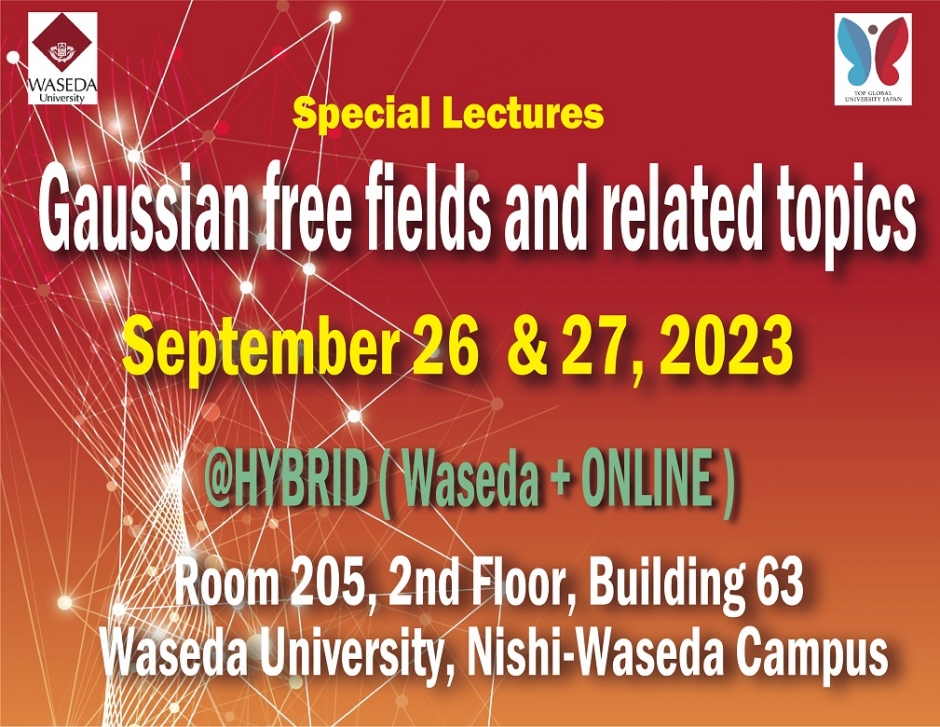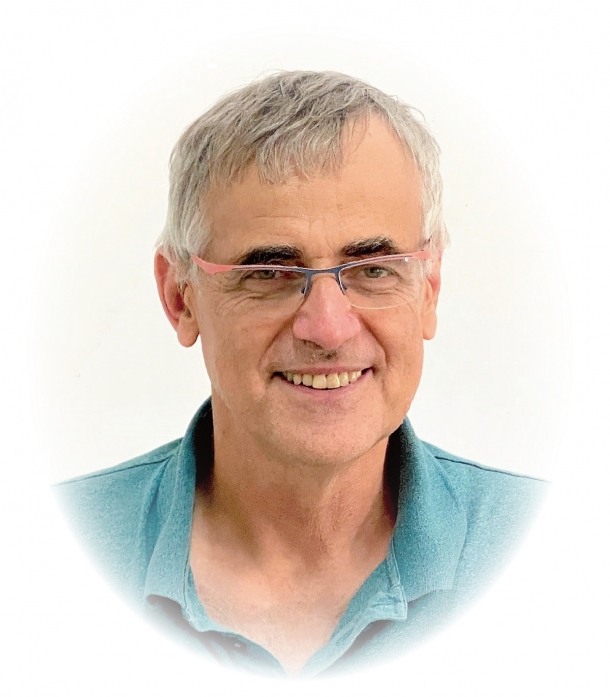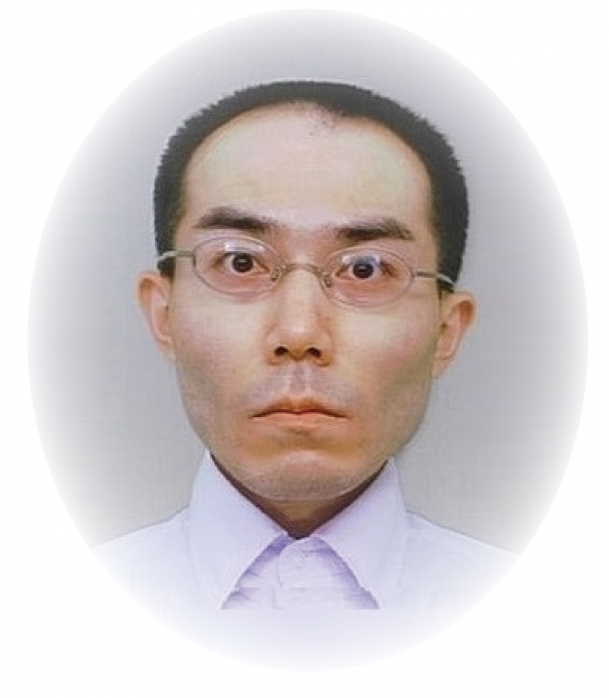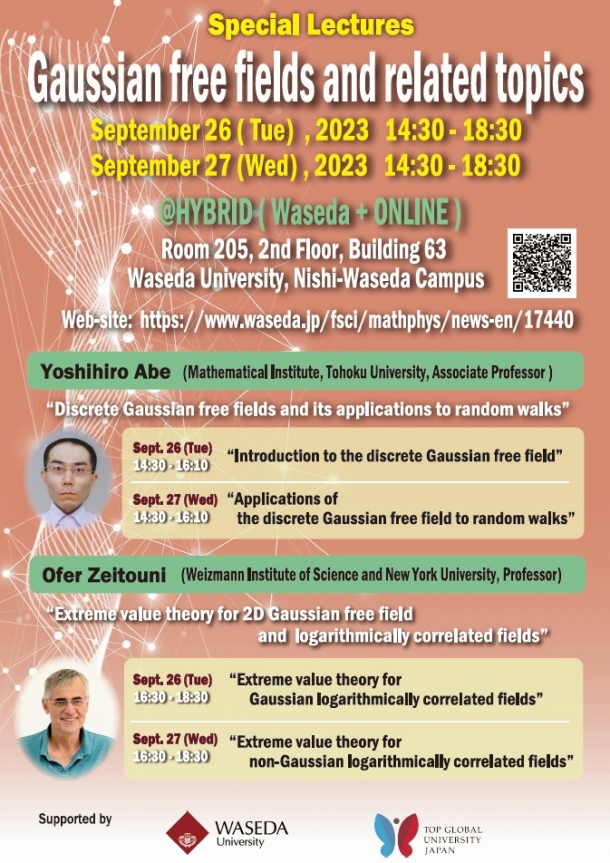- News
- Special Lectures "Gaussian free fields and related topics"
Special Lectures “Gaussian free fields and related topics”

Dates
Add to calendar0926
TUE 20230927
WED 2023- Place
- Room 205. 2nd Floor, Building 63, Waseda University, Nishi-Waseda Campus
- Time
- 14:30 - 18:30
- Posted
- Mon, 24 Jul 2023
On September 26th and 27th, 2023, the following special lectures will be delivered as part of the international activities of the Multiscale Analysis, Modelling and Simulation Unit. Professor Ofer Zeitouni and Professor Yoshihiro Abe will deliver lectures on Gaussian free fields and related topics.
Title
Gaussian free fields and related topics (Special Lectures)
Dates (Japan Time)
September 26 (Tuesday)
- 14:30-16:10 Yoshihiro Abe(Mathematical Institute, Tohoku University, Associate Professor )
- 16:30-18:30 Ofer Zeitouni (Weizmann Institute of Science and New York University, Professor)
September 27 (Wednesday)
- 14:30-16:10 Yoshihiro Abe(Mathematical Institute, Tohoku University, Associate Professor )
- 16:30-18:30 Ofer Zeitouni (Weizmann Institute of Science and New York University, Professor)
Lecturer
 |
Prof. Ofer ZeitouniWeizmann Institute of Science and New York University, Professor Lecture theme: Extreme value theory for 2D Gaussian free field and logarithmically correlated fields |
 |
Prof. Yoshihiro AbeMathematical Institute, Tohoku University, Associate Professor Lecture theme: Discrete Gaussian free fields and its applications to random walks |
Venue
Room 205, 2nd Floor, Building 63, Waseda University, Nishi-Waseda Campus (Access)/ Online via Zoom
Language
English
Audience
Researchers, Students
Open to the public through Zoom
Registration
Required. Please register from here.
Contact information
Inquiries about lecture content
Takashi KUMAGAI (Professor, Faculty of Science and Engineering, Waseda University)
t-kumagai [at] waseda.jp
Inquiries about registration, etc.
Multiscale Analysis, Modelling and Simulation Unit
info [at] sgu-mathphys.sci.waseda.ac.jp
Time Table (Including Q&A time)
September 26 (Tuesday), Japan Time
14:30 – 16:10 |
Yoshihiro Abe(Mathematical Institute, Tohoku University, Associate Professor )
|
| (Abstract) The discrete Gaussian free field (DGFF) is a centered Gaussian field on a graph whose covariance is given by the inverse of the graph Laplacian. It is a probabilistic model of interfaces and has connections with a lot of other models such as local times of random walks and branching random walks. In the first half of this lecture, I will give some motivation and basics of DGFF such as the random walk representation and the domain Markov property. In the second half, I will review some progress on the extreme value theory of DGFF on the integer lattice in three or higher dimensions. |
|
16:30 – 18:30 |
Ofer Zeitouni (Weizmann Institute of Science and New York University, Professor)
|
| (Abstract) The extreme value theory for Gaussian logarithmically correlated fields (G-LCFs) has emerged in the last decade as a powerful tool in the analysis of interface models, quantum gravity, random matrices and in a myriad of other applications. The two dimensional Gaussian free field (and its discrete analogue) is an important motivating example of such a field. In this lecture, I will describe the relation and differences between the extreme value theory for i.i.d. variables and that for G.-LCFs, and introduce the relation with branching structures and various tools such as comparison theorems, scale decompositions and relations to branching random walks. |
September 27 (Wednesday), Japan Time
14:30 – 16:10 |
Yoshihiro Abe(Mathematical Institute, Tohoku University, Associate Professor )
|
| (Abstract) The discrete Gaussian free field (DGFF) and the simple random walk (SRW) have a close relationship via the generalized second Ray-Knight theorem, which is a distributional identity between the square of DGFF and the local time of SRW. Thanks to the theorem, we have witnessed rapid progress on the studies of the cover time (the first time at which SRW visits all the vertices) and thick points of SRW (sites frequently visited by SRW). In the first half of this lecture, I will state the generalized second Ray-Knight theorem and review results on the cover time due to Ding-Lee-Peres (2012) and Zhai (2018) where we can see beautiful applications of the theorem. In the second half, I will focus on applications to thick points of SRW. |
|
16:30 – 18:30 |
Ofer Zeitouni (Weizmann Institute of Science and New York University, Professor)
|
| (Abstract) In the first lecture we discussed extreme value theory for logarithmically correlated Gaussian fields. In this talk I will discuss what changes in the non-Gaussian Gaussian setup. A prime example is the study of cover time of certain planar graphs or two dimensional manifolds by random walk or Brownian motion. In spite of precise and beautiful links through isomorphism theorems, the question about the cover time of the 2D torus by a Wiener sausage (or its discrete analogue) requires new tools. I will describe some work, old and recent, on this question, culminating with limit theorems for the cover time. If time permits, I will briefly discuss other types of non Gaussian LCFs. |

